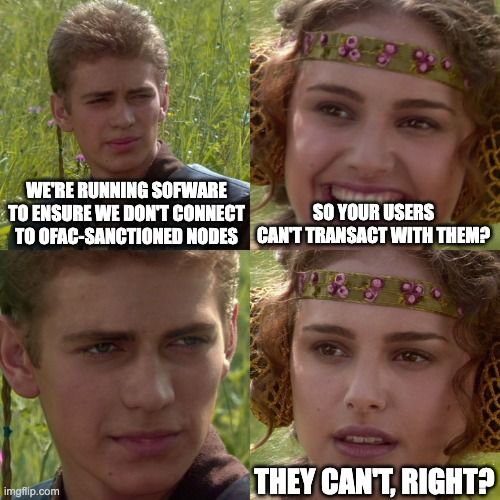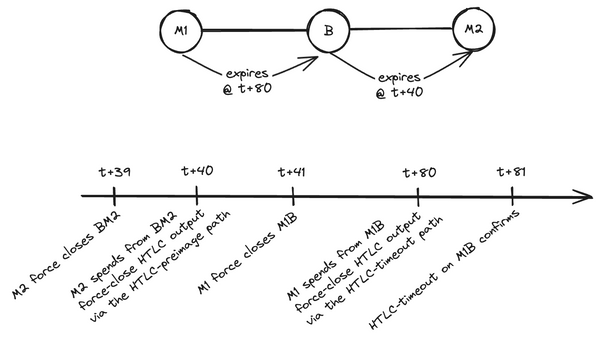Latest Strikes 44 - July 3rd-9th 2023

Ecosystem
Greetings! Welcome to the 44th issue of Latest Strikes, your weekly recap of all the things happening in Lightning! This week's piece is filled with great stuff, from open source grants to the mighty AI x Lightning convergence! I know exploring the Lightning space is a perilous enterprise, but I've still got the greatest enthusiasm and confidence in the mission. I'll take control now. Relax, Dave. Let's see what we got here ...
OpenSats Grants
OpenSats issued a new set of grants last week! While their not directly Lightning-related, the significance of this new grant system was enough to motivate a mention.
First, OpenSats initiated a new "Long Term Support" (LTS) program, which aims at providing major open source contributors with a stable income over at least twelve consecutive months, and potentially even more. Eligible are Bitcoin Core developers and other similar Load-Bearing Internet People (LBIP) who tirelessly contributed hundreds of hours to Bitcoin and its open source ecosystem, established a "track record of quality contributions", have a clear mission and motivation and are ready to work in public. Of course, as we're talking about OpenSats, applicants must also be Bitcoin-only, although the vagueness of this condition should probably not be considered a no-go for someone who worked on a 💩coin for a bit before returning full-time to Bitcoin. Many Bitcoin OGs were Ethereum enthusiasts at some point, before realizing the project wasn't headed in the right direction.
Why is this LTS program significant? Well, Bitcoin, as pretty much every open source piece of software or infrastructure, relies on quite a small set of contributors to maintain a project on which literally thousands of other projects and protocols are based. It is hence essential to provide balanced incentives to tireless contributors, as much to provide support to existing ones as to show aspiring LBIP that devoting one's life to Bitcoin can be a suitable career plan.
On top of that, OpenSats also revealed the repartition of the first wave of Nostr grants, which supports a dozen projects, from clients (mostly social media, but not only) to SDKs and relay implementations.
LNM Stuff
Last week was a release week at LN Markets! We pushed:
- increased trading limits (0.1 BTC of margin per trade, and 1 BTC per account),
- a new order type: stop limit orders,
- an upgrade to our Umbrel app, which will make further releases easier.
Also, two days ago we published a new issue of our newsletter, with Roy from Breez as our very special guest. Go give it a read!
Lightning & AI
This was probably the big thing last week, the one that would inevitably end up in the end of an Apple keynote, a "one more thing". Lightning Labs just unveiled a set of tools and specification material to foster the convergence between Artificial Intelligence (AI) and Bitcoin/Lightning. Lightning Labs announcement itself is a marvel at explaining the whys and the hows, but I'll try to give a more succinct exegesis of why this is such a big deal.
The problem at stake here is mostly an accessibility problem, but a twofold one:
- how can users easily access AI models and tools, even if they don't have a bank account or can't afford (or don't need) a monthly subscription?
- how can AI agents access data and perform actions in cyberspace in a sustainable way, that is without setting a high operational cost on the shoulders of the services they leverage so relentlessly?
The first issue comes down to a simple fact: large models are costly to train and run. Entities that offer such services must hence charge money to their users, which itself comes at a cost (notably due to payment processors fees and chargeback issues). This helps explain the current monetization model of AI tools, where a hefty monthly or yearly subscription is the norm. However, this kind of payment methods de facto excludes a large portion of the world's population, who don't have access to a credit card or bank account, or for who the price itself can be prohibitive or not aligned with their usage.
The second issue arises from the fact that AI agents can't have bank accounts either. How are they going to pay for some web hosting by themselves? Or when it comes to data scrapping, how could they alleviate the cost incurred to services they're visiting, due to their repeated queries? Or to look at the problem from the other side of the mirror, how could Twitter charge AI agents per request, instead of defaulting to rate limiting and making everyone's experience worst?
LangChainBitcoin is a solution to the latest problem and enables AI agents (more specifically, langchain agents[1]) to hold and use bitcoin (on-chain and Lightning) through a LND node. They can buy the compute and storage they need all by themselves, pay other AI agents fees, access data gated behind paid-APIs, and so on. This, of course, requires other AI agents and data sources to accept Bitcoin as a payment in the first place. This is enabled by (for example) Aperture, an HTTP reverse proxy that handles authentication and payment requests and finally gives a real use to the 402 error code. Aperture is perfectly suited for the job: it can easily be plugged to an existing API, where it handles this payment stuff and ensures that users do pay as required, and can be deployed in distributed systems thanks to its self-reliance and its independence from central databases[2].
But AI agents are not the only ones that could benefit from Lightning-enabled APIs: humans can too. For example, one can use ChatGPT without a monthly subscription, paying per request instead. This makes large models more widely accessible while diminishing the costs for developers and maintainers of those models, who are safe from traditional risks of the legacy payment system (such as chargebacks) thanks to Lightning's instant settlement.
In the not so distant future, machine to machine financial interactions might very well occur at scale, while sensible interface will enable humans to microtransact with AIs without friction. Of course, skeptics will argue that this will not happen on Lightning. That <insert 💩coin> is better suited for the job. VC money might even pour into these false promises. But ultimately, both machines and humans will converge toward the most widely accepted currency and the most scalable payment network[3].
By the way, there is an ongoing BoltFun tournament on this topic going all through July. Got a project idea? Go make it!
Open Music
The Wavlake team shared some very interesting thoughts around what open music can enable -- and enables already. Indeed, as you may already know, all the tracks listed on Wavlake are published their by their author, who agree to let anyone access and use this content, for free. The artist's compensation is sought in the Value4Value model: listeners can voluntarily decide to send some sats to the creator.
But there's more: if a podcaster uses a track in an episode, they can set some field in the podcast's RSS feed so that, during the time the song is aired, sats streamed by podcast players (using the Podcasting2.0 Value4Value paradigm) are directly sent to the original creator of the music. This opens up a whole new realm of cooperation between creators of all kinds, where every digital content can be reused freely, and where everyone can still get their fair share. Wanna know what's even crazier? We don't even need NFTs for this! I thought they were the cornerstone of the #web3 creator economy!
The Rise of Lightning Service Providers
Synonym published an interesting blog post last week on the subject of Lightning Service Providers (LSPs). The article goes into why LSPs are useful (especially providing liquidity to users, although LSPs will increasingly provide more and more services in the future, such as the handling of asynchronous payments, as Roy explained in our newsletter). It also expands into a comprehensive lists of the current existing LSPs providers and tools, their monetization models (does the LSP charges a one-time fee? a per transaction rate? does it lease channels?) ; as well as the future of LSPs, with their increased integration into merchants Point of Sales software and users wallets. Definitely worth a read!
CikKit Roadmap
The CivKit team shared an initial roadmap, which lacks a bit of precisely timed milestones, but provides an interesting categorization of the different building blocks the CivKit node is "relaying (sic) on".
Of course, the lack of milestones on this roadmap isn't directly imputable to the CivKit team. For example, this new protocol depends on Bolt12 and Onion Messages being sufficiently widely adopted in at least a subset of the Lightning Network, which is still a development in progress. Interestingly, the Staking Credentials part is expected for Q4 2023, which is also promising for Lightning as a whole, since such credentials could be part of the solution against channel jamming.
Wallets & Tools
ZapplePay
Remember Apple banning zaps? Well, seems like they're at it again (and again). However, thanks to fearless souls such as Ben Carman, we couldn't care less!
With ZapplePay, you can zap posts simply by commenting an emoji! It uses Nostr Wallet Connect[4] under the hood, allowing users to "setup and forget". For the more tech savvy, it is also possible to run the backend yourself, since it is open source tech. Now, either Apple bans emojis, or they concede defeat. In silence.
LNBits Security Update
LNBits got a new release last week, which notably brings a lot of security features. This update comes a few weeks after the LNBits team detected a vulnerability that would allow an attacker to steal funds from an instance.
Notable additions are:
- the ability to view logs directly from the admin interface in the browser, instead of having to connect through a terminal ;
- IP blocking and rate limiting, protecting one's LNBits instance from DoS attacks ;
- two opt-in features that involve pulling some data from a GitHub repository every minute to check for notifications from the LNBits team (for example for new releases), as well as a kill switch which will prevent the instance from making any payment until it is restarted. Of course, the kill switch will be triggered by the LN Bits team only if a critical exploit is discovered. And, once again, both features (notifications and kill switch) are disabled by default ;
- finally, a watchdog feature that periodically checks whether the LNBit's balance matches that of the underlying Lightning node, and automatically disables payments if they don't, until they are manually turned on again by the admin. This mechanism seems directly intended to protect against the type of attacks that were recently patched, but is not enabled by default yet until rigorous testing has been conducted.
That's quite a release! Shoutout to the team, and feel free to check the full release notes to see what else they've packed in there!
Spec & Implems
LND Minor Release
LND shipped a minor release last week fixing a memory leak introduced when performing optimizations in the new mempool scanning logic.
Closing Bit
D'Homère en Satoshi, illustres inconnus,
S'illustrant d'autant plus qu'on ne les connaît pas
Superbes et brillants, écrivant dans le noir
Un futur plus radieux qui par leur voix naîtra.
Langchain is a library that helps combining AI models, compute and data. It enables developers to easily chain actions, including (but not only) using the output of one AI model as the input of another. It can make ChatGPT speak, come with complex strategies, tap into databases and documents of all kinds (from an SQL database to a PDF), etc. ↩︎
The significance of this might be hard to convey, but paid APIs usually rely on a central database that stores authentication tokens and keeps track of whether a user's balance is still enough to cover their requests. Here, the use of macaroons allows the proxy to check by himself that a given user has paid enough to execute a given set of requests. ↩︎
Side note: Bitcoin e-cash might be a good fit for some of this use cases as well. See for example the Proxnut proxy that leverages the same 402 error code but expects a Cashu payment instead of Lightning. ↩︎
If you're using Alby, you can easily setup NWC using their service. Umbrel also has a dedicated app making it easy to set up and use without any technical knowledge. ↩︎





